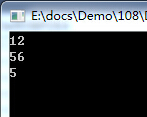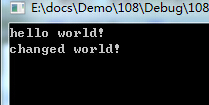C++基础--static的用法
首先,看看变量的存储:
int global ;
int main()
{
int stackStore ;
int heapStore* = (int *)malloc(sizeof(int));
}
变量global存储在全局数据存储区,stackStore存储在栈中,heapStore存储在堆中;
static作为静态修释符用法:
1.static可以用来修饰变量,也可以用来修饰函数,其用法相似;
2. static可以静态的呈现一个变量,在作用范围内不会改变变量的值;
3. 但是如果函数的局部变量复写了变量的值,那么这个值在当前局部函数内有效; 若出了当前局部范围,static的值生效;
例一, static在全局范围内,用include扩展static的作用范围, 用extern扩展函数的作用域:
107.h
#ifndef _107H_
#def _107H_ extern void func();
#endif
107.cpp

#include "stdafx.h"
#include <stdio.h>
#include <string.h>
#include "107.h" voic func()
{
x = 12;
printf("%d\n", x);
}

108.h
#ifndef _108H_
#def _108H_ extern void func1();
#endif
108.cpp

#include "stdafx.h"
#include <stdio.h>
#include <string.h>
#include "108.h" voic func1()
{
x = 56;
printf("%d\n", x);
}

109.cpp

#include "stdafx.h"
#include <stdio.h>
#include <string.h>
#include "107.h"
#include "108.h" int main()
{
func();
func1();
printf("%d", x);
}

输出结果为:

例二,static在当前文本作用域,用extern扩展函数的作用域:
file1.h
#ifndef _FILE1_
#define _FILE1_ extern void func1();
extern void func2(); #endif
file1.cpp
#include "stdafx.h"
#include <stdio.h>
#include <string.h>
#include "file1.h" static char* hello = "hello world!";
void func1()
{
printf("%s\n", hello);
} void func2()
{
hello = "changed world!";
printf("%s\n", hello);
}
file2.cpp
#include "stdafx.h"
#include <stdio.h>
#include <string.h>
#include "file1.h" int main()
{
func1();
func2(); return ;
}
输出结果:

!!! 若将static char* hello = "hello world!"放入func1, 如下;
file1.cpp
#include "stdafx.h"
#include <stdio.h>
#include <string.h>
#include "file1.h" void func1()
{
static char* hello = "hello world!";
printf("%s\n", hello);
} void func2()
{
hello = "changed world!";
printf("%s\n", hello);
}
那就会出错,错误为:

C++基础--static的用法的更多相关文章
- EasyUI中Base(基础)的基本用法
EasyUI中Base(基础)的用法 一.Base(基础) 1.parser 解析器 2.easyloader 简单加载 3.draggable 拖动 4.droppable 放置 5.resizab ...
- Java中static的用法
static静态,作为修饰符,最初是由c引入,一开始static表示退出一个块后依然存在的局部变量.随后,static表示不能被其他文件访问的全局变量和函数.到了C++和java,static表示属于 ...
- ava下static关键字用法详解
Java下static关键字用法详解 本文章介绍了java下static关键字的用法,大部分内容摘自原作者,在此学习并分享给大家. Static关键字可以修饰什么? 从以下测试可以看出, static ...
- scrapy之基础概念与用法
scrapy之基础概念与用法 框架 所谓的框架就是一个项目的半成品.也可以说成是一个已经被集成了各种功能(高性能异步下载.队列.分布式.解析.持久化等)的具有很强通用性的项目模板. 安装 Linux: ...
- C# static的用法详解
C# static的用法详解 有的东西你天天在用,但未必就代表你真正了解它,正如我之前所了解的 static . 一.静态类 静态类与非静态类的重要区别在于静态类不能实例化,也就是说,不能使用 n ...
- java基础 -- 关键字static的用法
static关键字的基本作用就是方便在没有创建对象的情况下调用类的方法/变量, static关键字修饰的方法或者变量不需要依赖于对象来进行访问,只要类被加载了,就可以通过类名去进行访问. static ...
- 【C#基础】static 关键字用法小结
静态变量 当我们编写一个类时,其实就是在描述其对象的属性和行为,而并没有产生实质上的对象,只有通过new关键字才会产生出对象,这时系统才会分配内存空间给对象,其方法才可以供外部调用. 有时候,我们希望 ...
- static的用法
首先,看看变量的存储: int global ; int main() { int stackStore ; int heapStore* = (int *)malloc(sizeof(int)); ...
- static之用法
本文转载于http://www.cnblogs.com/stoneJin/archive/2011/09/21/2183313.html 在C语言中,static的字面意思很容易把我们导入歧途,其实它 ...
随机推荐
- ThinkCMF Foreach标签
foreach标签类似与volist标签,只是更加简单,没有太多额外的属性,例如: <foreach name="list" item="vo"> ...
- flask总结05(在 Flask 项目中解决 CSRF 攻击)
一:安装 flask_wtf pip install flask_wtf 二:设置应用程序的 secret_key,用于加密生成的 csrf_token 的值 # session加密的时候已经配置过了 ...
- vue 遇到的一个问题......
当我用 @tap 或者 @click 触发 ajax事件时,返回的结果会非常慢--- 我也不清楚为啥会这样....(仅仅在chrome下会这样--- 所以 我用 touchend 方法替代了 该方法. ...
- let 和 var 的区别笔记
参考文章:阮一峰 ECMAScript 6 入门 ES6中新增加了 let 声明,它跟 var 的区别如下: 1.作用域不同,let 只在代码块中有效 { var a = '123'; le ...
- sharepoint_study_1
描述:机器上进行SharePoint开发,需要SQL Server提供最基本的服务 解决: SQL Server 的数据库引擎: SQL Server 代理: SQL Server 浏览器组件:
- hdu3068 最长回文 马拉车模板题
题目传送门 马拉车算法模板题. 学习博客 #include<bits/stdc++.h> #define clr(a,b) memset(a,b,sizeof(a)) using name ...
- UVA - 11996 可持久化Treap 维护Hash Ver.2
这回总算是过了.. 4600ms+,服务器抖一抖又没了 对于极端卡时间的情况还是考虑屈服于Splay吧 #include<iostream> #include<algorithm&g ...
- 有用的 Angular CLI 命令参数
这是一些有用的 Angular 5 CLI 命令参数,注意参数前面的-和--的不同... 1. 指定build的输出为production version,合并优化css and js files. ...
- python 函数的作用域,闭包函数的用法
一.三元表达式 if条件成功的值 if 条件 else else条件成功的值 #if条件成立的结果 if 条件 else else条件成立的结果 # a = 20 # b = 10 # c ...
- 集成 Jenkins 和 TestNG 实现自助式自动化测试平台
背景介绍 在软件业十分成熟的今天,敏捷(Agile)开发在业界日益流行,而面临的挑战也日益增多,不断变化的用户需求.缩短的开发周期.频繁的部署上线.复杂的产品架构和团队组织,如何继续保证软件的质量是一 ...
